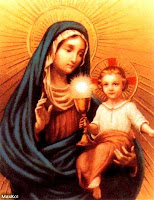Eucharistic Reflection - How Can We Just Walk Up There and Receive Him?
“A student of mine once asked, ‘If it is true that the
host at Mass is not just a symbol of Christ, but really Christ himself,
how can we just walk up there and receive him? I mean, we aren’t good
enough for that.’ There are so many things that could be said in answer to that
wonderfully humble and thoughtful question, but the first and most obvious
answer is, ‘You are right!’
 |
| (Image Source: Wikimedia Commons) |
Apropos is the saying attributed to St. Francis
of Assisi: Man should tremble, the world should quake, all Heaven
should be deeply moved when the Son of God appears on the altar in the hands of
the priest. None of us is worthy to approach God, much less receive
him. None would dare to even think of it, were it not for the decree of
our Lord himself: ‘Unless you eat the flesh of the Son of man and drink his
blood, you have no life in you’ (Jn 6:53). And so, at each
Mass, when we hear repeated the words of Jesus at the Last
Supper, “Take this, all of you, and eat of it,” humbly and
gratefully, we obey.
Deeply aware of our own inadequacy, we repeat
what was said 2000 years ago by a Roman centurion, 'Lord, I am not worthy that
you should enter under my roof” (Mt 8:8). When the centurion first
proclaimed those words, and asked that his servant be healed by the mere word
of authority, our Lord was pleased with the expression of such great faith. The
centurion’s servant was healed without ever being touched physically by the
Healer. Encouraged by this encounter, we dare to beg, “Only say the word,
and my soul shall be healed.”
With great faith in the power of God’s authority, we
approach him, and in receiving him, we are transformed. Our dear Lord himself
said, 'He who eats my flesh and drinks my blood abides in me, and I in him'
(Jn 6:56). Thus, St. Augustine declares in his Confessions,
that through the reception of Holy Communion, Christ is not changed into us,
like bodily food, but the recipient is changed into Christ. He transforms us
into himself. By that transformation alone, do we dare to take God
into ourselves.
The 17th century spiritual author, Fr. Lorenzo Scupoli,
was describing just that transformation in his prayer to our Eucharistic Lord, '… you desire to give me the whole of yourself as food and drink for no other
purpose but to transmute the whole of me into yourself … for in this way, you
dwell in me, and I in you; and through this union of love, I become as you are
… through the union of my earthly heart with your heavenly heart, a single
divine heart is created in me'.”
(From Homiletic & Pastoral Review, A Divine
Reflection: You and the Holy Eucharist by Margaret O’Reilly. See full article
here.)



Comments